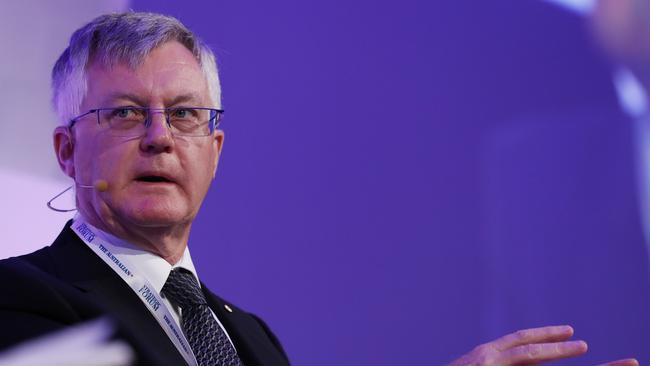MPs’ China ban a ‘public relations failure’, says Martin Parkinson
China’s rejection of travel visas for two Australian politicians was a sign of diplomatic immaturity, Martin Parkinson says.

China’s rejection of travel visas for two Australian politicians was a sign of diplomatic immaturity, a former head of the Department of Prime Minister and Cabinet has told The Australian’s Strategic Forum in Sydney.
Martin Parkinson said the move had thrown away an opportunity for China to explain its viewpoint to two politicians who have been critical of the country.
West Australian Liberal MP Andrew Hastie, the chairman of the parliamentary security and intelligence committee, and Liberal senator James Paterson have been barred from a visit hosted by the think tank China Matters.
Mr Parkinson said it would be “quite chilling” if the decision to ban the two politicians from visiting China led to other politicians self-censoring their comments.
Josh Frydenberg said the federal government was “deeply disappointed” at the move to ban the MPs.
“Here you had two Australian elected members of parliament who were looking to engage with the Chinese people and who were planning to go with a very reputable organisation,” the Treasurer said. “I’m deeply disappointed that this has occurred. And I think it is counterproductive.”
Mr Frydenberg said he was also concerned at comments made by the Chinese embassy that implied the two would need to “repent or redress their views” in order to get access to China.
Mr Parkinson said people who were watching China a decade ago “were hoping that China was on a pathway to becoming a responsible citizen of the world” that would see China having some of the “soft power” of mayor powers.
“But it doesn’t have that soft power asset in the current situation,” he said. “(The decision to refuse visas for the MPs) is a real sign of immaturity in their part to have handled it in this way.”
John Lee, a former adviser to former foreign minister Julie Bishop, said the decision was an “own goal for China”. “The attractiveness of the (Chinese) system suffered as a result,” said Mr Lee, who is now a senior fellow at the US Studies Centre in Sydney.
He said the China of 10 years ago would have “rolled out the red carpet” for the politicians in a bid to explain its point of view.
“That would be the smart public relations things to do,” he said.
“These two MPs are not going to recant their views. This is a PR failure for the Chinese.”
Businessman Andrew Michelmore, the former chief executive of MMG and a board member of China Matters, defended the decision. He said the move by the Chinese embassy had followed some adverse comments about the proposed visit in The West Australian newspaper, which he said was “like throwing some fuel on the fire”.
Mr Parkinson said he did not expect Australia’s strained diplomatic relationship with China would lead to a major cut-back in Australia’s trading relationship.
“Conventional wisdom is that they (the Chinese) have got us over a barrel,” he said. “But I don’t agree with it. You have to be careful about thinking they have all the levers. They are not monolithic.”
He said it could see some limitations on the growth of tourism and student numbers to Australia but he did not think it would see action that would have a major detrimental impact on the Australian economy.
“If they turned off the taps on tourism overnight, that is going to irritate (China’s) middle classes.
“If they turn off the taps on higher education, it will irritate the middle classes,” he said.




To join the conversation, please log in. Don't have an account? Register
Join the conversation, you are commenting as Logout